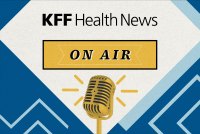Latest Morning Briefing Stories
A More Aggressive FTC Is Starting to Target Drug Mergers and Industry Middlemen
Industry analysts are skeptical that Federal Trade Commission Chair Lina Khan can win her first fight against a drug industry merger. It will be reviewed by a judge appointed by then-President Donald Trump.
La Comisión Federal de Comercio está actuando contra las empresas farmacéuticas y los intermediarios del sector, como parte de la campaña de la administración Biden para reducir los precios de los medicamentos en las farmacias.
What the Health? From KFF Health News: The Abortion Pill Goes Back to Court
A three-judge appeals court panel heard testimony this week about revoking the FDA’s 22-year-old approval of a key pill used in medication abortion and miscarriage management. The judges all have track records of siding with abortion foes. Meanwhile, as the standoff over raising the federal debt ceiling continues in Washington, a major sticking point is whether to impose work requirements on recipients of Medicaid coverage. Victoria Knight of Axios, Rachel Roubein of The Washington Post, and Sandhya Raman of CQ Roll Call join KFF Health News chief Washington correspondent Julie Rovner to discuss these issues and more.
Watch: 5th Circuit Judges Question Two-Decade-Old Approval of Abortion Pill
The 5th Circuit Court of Appeals in New Orleans heard oral arguments Wednesday in a case brought by conservative Christian abortion opponents seeking to revoke FDA approval of mifepristone, a medication used in more than half of abortions in the U.S.
Lawyer Fees Draw Scrutiny as Camp Lejeune Claims Stack Up
The Camp Lejeune Justice Act, which became law last year, created a pathway for veterans and their families to pursue damage claims against the government for toxic exposure at the military base. Now, advocates and lawmakers worry high lawyer fees could shortchange those injured.
ER Doctors Vow to Pursue Case Against Envision Despite Bankruptcy
The lawyer for an emergency physicians group says its lawsuit against Envision Healthcare should be allowed to proceed even though the company has filed for Chapter 11 protection.
Can a Fetus Be an Employee? States Are Testing the Boundaries of Personhood After ‘Dobbs’
Laws granting rights to unborn children have spread in the decades since the U.S. and Missouri supreme courts allowed Missouri’s definition of life as beginning at conception to stand. Now, a wrongful death lawsuit involving a workplace accident shows how sprawling those laws — often intended to curb abortion — have become.
What the Health? From KFF Health News: Health Programs Are at Risk as Debt Ceiling Cave-In Looms
A warning from the Treasury Department that the U.S. could default on its debt as soon as June 1 has galvanized lawmakers to intervene. But there is still no obvious way to reconcile Republican demands to slash federal spending with President Joe Biden’s demand to raise the debt ceiling and save the spending fight for a later date. Meanwhile, efforts to pass abortion bans in conservative states are starting to stall as some Republicans rebel against the most severe bans. Joanne Kenen of the Johns Hopkins Bloomberg School of Public Health and Politico, Rachel Cohrs of Stat, and Alice Miranda Ollstein of Politico join KFF Health News chief Washington correspondent Julie Rovner to discuss these issues and more.
Journalists Discuss Enduring Effects of Long Covid and Handling of Opioid Settlement Funds
KFF Health News and California Healthline staff made the rounds on national and local media this week to discuss their stories. Here’s a collection of their appearances.
Disability Rights Groups Sue to Overturn California’s Physician-Assisted Death Law
Disability rights advocates and two individuals with disabilities sued Tuesday to overturn the state’s physician-assisted death law, arguing it is unconstitutional, violates the Americans with Disabilities Act, and makes it too easy for people with terminal diseases whose deaths aren’t imminent to kill themselves with a doctor’s help.
Presentan demanda para revocar ley de muerte asistida en California
La ley original de California, que permite a los adultos con enfermedades terminales obtener recetas para medicamentos que pongan fin a su vida, se aprobó en 2016.
Listen: Mifepristone Remains Available for Now. What Happens Next?
The Supreme Court on April 21 ruled that the abortion pill mifepristone should remain widely available while the lower courts consider the issue, blocking earlier rulings that banned or restricted access to the drug. KFF Health News’ Julie Rovner joined NPR’s “Weekend All Things Considered” to discuss the complicated case.
What the Health? From KFF Health News: Will They or Won’t They (Block the Abortion Pill)?
The Supreme Court is considering the future of the abortion pill mifepristone, after GenBioPro sued the FDA over limitations that effectively block generic production of the drug, a major part of the market. Congress is considering proposals that would impose Medicaid work requirements, crack down on pharmacy benefit managers, and more. And President Joe Biden moved to expand health coverage to young immigrants known as “Dreamers.” Rachel Cohrs of Stat, Sandhya Raman of CQ Roll Call, and Joanne Kenen of the Johns Hopkins Bloomberg School of Public Health and Politico join KFF Health News’ Mary Agnes Carey to discuss these issues and more.
An Arm and a Leg: A $229,000 Medical Bill Goes to Court
Lisa French was told her surgery would cost $1,337. But the hospital sent her a bill for $229,000, then sued her. The case went all the way to the Colorado Supreme Court. The court’s ruling could have major implications for determining a “reasonable price” in health care.
What the Health? From KFF Health News: The Confusing Fate of the Abortion Pill
The legality and availability of the abortion pill mifepristone is in question after a federal judge in Texas canceled the FDA’s approval of the first drug used in the two-drug medication abortion regimen. A 5th Circuit Court of Appeals panel overruled that decision in part, saying the pill should remain available, but only under the onerous restrictions in place before 2016. Meanwhile, another federal judge in Washington state issued a ruling in a separate case that conflicts with the Texas decision, ordering the FDA not to roll back any of its restrictions on the drug. Victoria Knight of Axios, Shefali Luthra of The 19th, and Sarah Karlin-Smith of the Pink Sheet join KFF Health News chief Washington correspondent Julie Rovner to discuss these issues and more.
Doctors’ Lesson for Drug Industry: Abortion Wars Are Dangerous to Ignore
The American Medical Association ducked the abortion issue for years and now sees its members’ professional opinions second-guessed by lawmakers and judges. PhRMA is following the same playbook.
No-Cost Preventive Services Are Now in Jeopardy. Here’s What You Need to Know.
A federal judge’s recent ruling on the Affordable Care Act is by no means the final word. Even parsing its impact is complicated. Here are key issues to watch as the case works its way through the legal system.
La decisión podría afectar los exámenes de detección sin copago y servicios preventivos similares que la mayoría de los estadounidenses con seguro tienen como parte de sus planes de salud.
Judge’s Decision Would Make Some No-Cost Cancer Screenings a Thing of the Past
A U.S. District Court ruling overturned the section of the Affordable Care Act that makes preventive health services — from colonoscopies to diabetes screenings and more — available at no cost to consumers.
Legal Questions, Inquiries Intensify Around Noble Health’s Rural Missouri Hospital Closures
A year after private equity-backed Noble Health shuttered two rural Missouri hospitals, a slew of lawsuits and state and federal investigations grind forward. Missouri Attorney General Andrew Bailey recently confirmed an “ongoing” investigation as former employees continue to go unpaid and cope with unpaid medical claims.




















